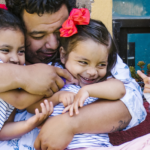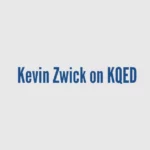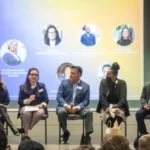Search
TURNING THE PAGE…
April 29, 2021

By: Kevin Zwick
Like many of you, this month I experienced the incredible relief of receiving my first dose of the COVID-19 vaccine. This certainly felt like a moment of celebration and a step toward turning the page on this deeply challenging chapter in all our lives. At the same time, I know we have so much more work ahead in order to rebuild our region and define a more equitable new normal. While over a third of Bay Area residents are now fully vaccinated, many of our hardest-to-reach communities still aren’t getting the information, reassurance, and access they need. One resource available to help address that challenge is 211 – United Way Bay Area’s hotline that provides referrals to critical community services. We’ve seen a big surge in calls to 211 over the past year – connecting nearly 100,000 callers to support – double what we see in a normal year. Because of 211, Bay Area residents have access to information 24/7 in multiple languages so that people can navigate the challenges in their lives – which may include accessing vaccine information, mental health or legal services, food, renter protections, and so much more.
“We can’t turn the page on this pandemic without addressing our housing crisis…”
The biggest issue people across our region faced this past year was the fear of losing their home. We can’t turn the page on this pandemic without addressing our housing crisis, so we are working with partners across sectors to help individuals and families stay in their homes. Thanks to many generous donors and a lead investment from Wells Fargo, United Way Bay Area is providing over $3M in rent assistance. While we are proud of the impact this program provides, to truly turn the page on our housing crisis, we will need bold federal, state, and regional policy solutions, as well as redoubled local efforts, to keep people in their homes and make sure everyone can access affordable housing.
We know that the housing crisis is a root cause of poverty – and so is the structural racism that creates inequities throughout our community. Over the past year, we saw many families and individuals who rely on United Way Bay Area heavily impacted by the overlapping crises amplified by the pandemic, facing job losses, school closures, housing instability, resource gaps, and many other challenges. All these challenges hit communities of color the hardest, reflected by the 81% of our clients who identify as people of color. In order to uproot this inequity, we must all do the hard work of dismantling the racist systems of oppression woven into the fabric of our region and our nation. At UWBA, we have started our own journey toward becoming an anti-racist organization, because deepening our focus on fighting racism is essential to breaking the cycle of poverty.
Together, we are starting the hard work of emerging from crisis and beginning to rebuild a more equitable future. To continue our fight to disrupt poverty, we are helping hundreds of thousands of our Bay Area neighbors meet their basic food and shelter needs and achieve their financial goals. We are supporting young adults on their career paths. We are providing support to wildfire survivors. Together, we are doing all of this and so much more. We are also beginning to write our next chapter in a new three-year strategic plan, setting a bold vision for the more impactful, anti-racist, community-centered organization we are striving to be.
“…engage with us, challenge us and get more involved with us…”
Finally, to better engage with all of you on all of that, we are turning the page online as we proudly launch our new and improved website. We are making it easier to engage with us, clarifying how to access our services and get more involved in our work. We are making our commitments to anti-racism, diversity, equity, and inclusion more explicit. I hope you will use this platform to stay connected with us so that, together, we can create more impactful solutions for our community. Please consider this your personal invitation to engage with us, challenge us and get more involved with us so that we can write the next chapter of a more equitable Bay Area together.


